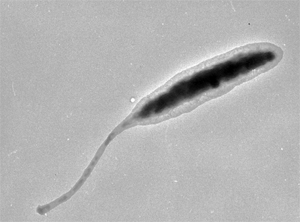Maricaulis maris is a stalked, biofilm-forming marine bacterium that scavenges carbon in oligotrophic habitats, volatilizes mercury, and tolerates a wide range of temperatures and oxygen levels. Stalked bacteria of the Caulobacter family are globally distributed, and ubiquitous in low nutrient aquatic habitats and biofilms. The polar stalk enhances nutrient uptake, while the holdfast the stalk tip anchors cells in biofilms. Comparative analysis of nutrient acquisition, polar organelle development, and biofilm formation in Maricaulis maris, the freshwater strain Caulobacter crescentus , and the groundwater strain Caulobacter K31 will shed light on these features and reveal unique adaptations to each niche. Maricaulis maris produces the longest, thickest stalk of these three species, is amenable to genetic analysis and manipulation, and provides another model for exploring the genomics and physiology of marine oligotrophs. This species was isolated from Puget Sound by J. Smit and colleagues at the University of British Columbia. References: Anast, N, and Smit, J. 1988. Isolation and characterization of marine Caulobacters and assessment of their potential for genetic experimentation. Appl. Env. Microbiol. 54: 809-817. Stahl DA, Key R, Flesher B, Smit J. 1992. The phylogeny of marine and freshwater Caulobacters reflects their habitat. J Bacteriol. 174:2193-8 Yun C, Ely B, Smit J. 1994. Identification of genes affecting production of the adhesive holdfast of a marine caulobacter. J Bacteriol. 176:796-803. Ji GY, Salzberg SP, Silver S. Cell-free mercury volatilization activity from three marine caulobacter strains. Appl Environ Microbiol. 1989, 55:523-5.
|
||
|
||
Maricaulis maris

